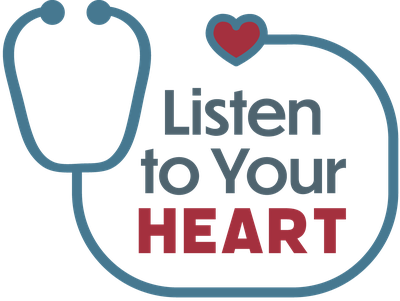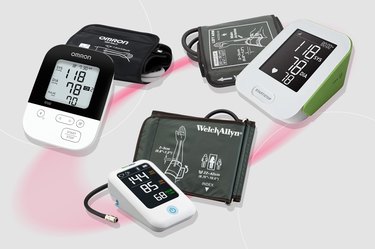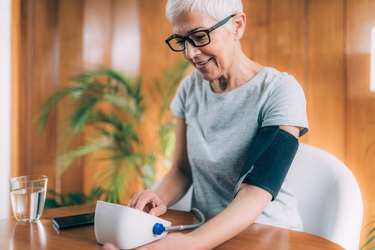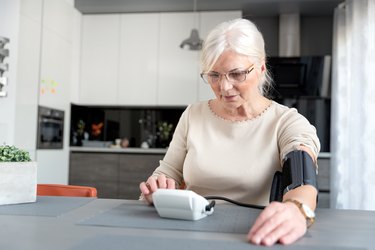
If you've been diagnosed with hypertension, you might be wondering about ways to lower blood pressure that don't involve drugs. BP meds tend to be a long-term commitment, after all, and sometimes they can have not-so-fun side effects like dizziness, weakness, headache, constipation or diarrhea, and nausea or vomiting.
The good news is that natural ways to lower blood pressure abound. Healthy lifestyle changes like managing stress, moving more and eating the best foods to lower blood pressure can go a long way toward bringing your numbers down. According to a study presented by the AHA in September 2018, that's especially true if your BP falls between 130/80 and 160/99.
Here are 13 expert-backed natural remedies for high blood pressure.
Warning
Blood pressure above 180/120 is considered immediately life-threatening and requires medical attention. If you get two consecutive readings of 180/120 or higher, five minutes apart, call 911 right away.
1. Slash Your Salt Intake
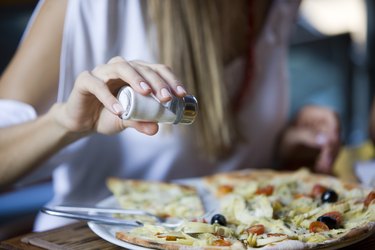
You should keep your sodium consumption below 2,300 milligrams daily if your BP is healthy, and below 1,500 milligrams a day if your BP is high, according to the AHA.
"One of the major reasons excess salt causes blood pressure to rise is because it increases the volume of fluid in the body, which puts extra strain on the heart and kidneys," dietitian Sarah Pflugradt, RD, tells LIVESTRONG.com.
One of the best ways to cut back on salt is by limiting your consumption of processed or packaged foods — and choosing lower-sodium options whenever possible.
"A good rule is to make each meal less than 500 milligrams sodium total," Pflugradt says. "Always check the food label on packages to make sure you stay below that amount."
Relying on salt-free flavorings for cooking — like fresh herbs, spices, citrus and vinegar — can also make a difference.
Related Reading
2. Pay Attention to Potassium
Getting your fill of the mineral may actually help your lower-salt efforts go further. "Potassium can help the body get rid of excess sodium, and this can ease pressure on our blood vessels," Pflugradt says.
How much do you need? If you're trying to lower your blood pressure naturally, aim to get at least 4,700 milligrams of potassium daily, recommends the AHA. Bananas are one good source, but you can also find potassium in sweet potatoes, apricots, avocado, yogurt, grapefruit and leafy green veggies.
Prefer a More Structured Eating Plan?
Find out how the DASH diet (that's Dietary Approaches to Stop Hypertension) can help lower blood pressure.
3. Take a Walk Every Day

Regular aerobic exercise is key for strengthening your heart so it doesn't have to work as hard to pump blood throughout your body. And that can help lower your systolic blood pressure (the top number) by as many as nine points, according to the Mayo Clinic.
And walking is one of the simplest forms of aerobic exercise out there — you can do it anywhere, with zero special equipment.
A healthy goal is to walk for at least 30 minutes most days of the week, per the Centers for Disease Control and Prevention. According to a February 2019 study published in the journal Hypertension, that amount could produce similar effects to blood pressure-lowering medication, although it's important to note that more research needs to be done in this area.
4. Lose Weight
Having overweight can strain your heart and potentially damage your blood vessels, both of which could contribute to high BP.
"There's a clear association between obesity and hypertension," Emmanuel Moustakakis, MD, director of the coronary care unit at NewYork-Presbyterian Queens and assistant professor of clinical medicine at Weill Cornell Medicine, tells LIVESTRONG.com.
The good news? You don't necessarily have to drop tons of weight to see a difference. Losing just 5 to 10 pounds could get you a whole lot closer to a healthier reading, according to the AHA.
5. Try Hand-Grip Exercises
Squeezing a hand gripper (or tennis ball) for a few minutes every day could lower your blood pressure by as much as six points, found a December 2018 Systematic Reviews analysis of 26 studies.
Try squeezing the gripper with one hand for two full minutes, using about half your full strength, Dr. Moustakakis recommends. Rest for two minutes before gripping with your other hand, and repeat the cycle once more.
6. Find Healthy Ways to Relax
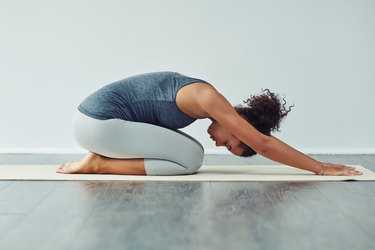
Stress can cause your blood pressure to skyrocket, and over time, that can lead to chronic high blood pressure and do damage to your cardiovascular system.
"Stress raises levels of the hormones adrenaline and cortisone, which disrupt the smooth lining of the blood vessels," explains Sanjiv Patel, MD, interventional cardiologist at MemorialCare Heart & Vascular Institute at Orange Coast Medical Center.
Meditation, guided imagery, deep breathing and yoga can all be effective, according to Harvard Health Publishing.
In fact, one March 2019 Mayo Clinic Proceedings review of 49 studies found that practicing yoga three times per week along with breathing and relaxation exercises can lower blood pressure by around 11 points.
Want to Start a Yoga Practice?
Here's everything you need to know, including the best poses for beginners.
7. Get Outside More Often
Mother Nature has a serious mood-boosting effect. Spending time in green spaces brings down levels of stress hormones like cortisol and staves off feelings of depression and anxiety — all of which could help improve your blood pressure, according to Harvard Health Publishing.
Best of all, you don't necessarily have to trek to the beach or head deep into the woods to reap the benefits. Just being in a space with some trees and greenery could translate to lower stress levels and healthier blood vessels, suggest findings a December 2018 study in the Journal of the American Heart Association.
8. Take Lots of Breaks From Sitting

Even if you exercise regularly, too much time at your desk or on the couch is bad for your blood pressure, concluded a September 2018 review in Hypertension. The more you sit, the less energy you expend overall. "That leads to an increase in fat storage and stress hormones, which can cause higher blood pressure," Dr. Patel says.
If you're sitting for long periods, set reminders on your phone to get up and stretch your legs every 30 minutes or so, Dr. Patel recommends. Better yet: Find ways to stay on your feet for more of the day. Pace when you're on the phone, or meet your friend for a walk instead of sitting down for coffee, for example.
Warning
None of these methods are a substitute for blood pressure medication. If you've been prescribed medication for high blood pressure, talk to your doctor before stopping or changing the frequency of your medication, and ask which lifestyle changes may be most effective for you.
9. Get Enough Sleep
Logging enough shut-eye doesn't just help you feel energized and refreshed — it could also be better for your blood pressure.
People who sleep for five hours or less per night are more likely to have high BP compared to those who snooze for the recommended seven to eight hours, according to a review in the Journal of Clinical Sleep Medicine. Why? Too-little sleep seems to ramp up the production of stress hormones like cortisol, which over time can drive up blood pressure, per the Mayo Clinic.
Related Reading
10. Go Easy on the Booze
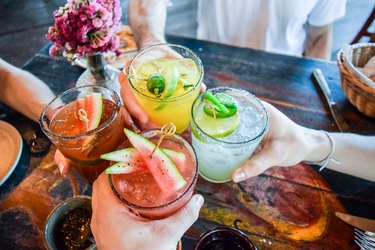
Moderate drinking might lower your blood pressure by around four points, according to the Mayo Clinic. But drinking more won't deliver bigger benefits. And in fact, it could actually make your blood pressure problem worse.
Experts don't fully understand why, but it could be that alcohol increases the constriction of blood vessels and causes the body to retain more sodium, Pflugradt says. So if you choose to drink, stick with no more than one drink a day for women or two for men.
11. Quit Smoking
Smoking increases your blood pressure, according to the Mayo Clinic, but nixing the habit can help bring your numbers down and lower your risk of heart disease.
Easier said than done, of course. But there are strategies that can help you kick the habit for good.
12. Consider Cutting Down on Caffeine
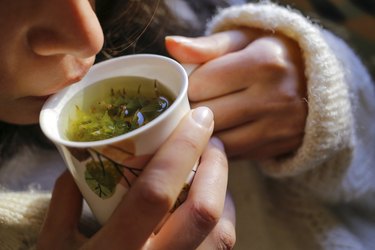
Caffeine's effect on blood pressure isn't totally clear, but it may contribute to higher numbers for some people who are more sensitive to it, per the Mayo Clinic.
You can check if this is the case for you by taking your blood pressure before you have caffeine and then again within a half hour of drinking coffee or another caffeinated beverage. If your BP goes up by 5 to 10 points, then you may want to consider cutting back or quitting the substance altogether.
13. Check Your Blood Pressure Often
Knowledge is power, as they say. Keeping a close watch on your blood pressure can help you keep BP management at the top of your mind. That means seeing your doctor for regular checkups and, if they approve, monitoring your blood pressure at home.
Using an at-home monitor can help you determine whether the natural remedies for high blood pressure you've tried are actually working.
14. Ask Your Doctor About Supplements
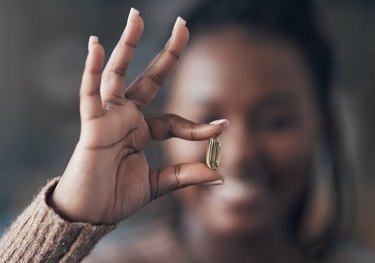
Some supplements have shown promise when it comes to lowering blood pressure. They're not right for everyone, though, so have a conversation with your doctor before adding any supplement to your routine.
Here are the two supplements with the strongest evidence behind them:
- Garlic: A February 2016 review and meta-analysis in The Journal of Nutrition found that garlic supplements have the potential to lower blood pressure in people with hypertension, but the authors noted that these should be used in addition to other treatments.
- Fish oil: Fish oil supplements with EPA and DHA may be able to lower systolic BP (the top number) by as much as 4.5 points, and diastolic BP (the bottom number) by 3 points, according to a July 2014 meta-analysis of randomized controlled trials in the American Journal of Hypertension.
15. Get Support
It's easier to make — and stick with — healthy lifestyle changes when you have someone in your corner. Let family and friends know about your goal to reduce your high blood pressure, and ask them to keep you accountable to your wellness goals.
You can also consider joining a support group, such as one run by your local hospital. Ask your doctor for recommendations.
Is this an emergency? If you are experiencing serious medical symptoms, please see the National Library of Medicine’s list of signs you need emergency medical attention or call 911.
